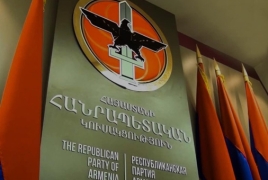
The Republican Party of Armenia (RPA) has responded to a recent statement by Armenia’s Ministry of Foreign Affairs on the Nagorno-Karabakh conflict, declaring that the issue remains unresolved and must be reinstated in the country’s foreign policy agenda following what they describe as an inevitable change of government.
The RPA claims that since the 2018 political shift, the ruling administration has pursued a “reckless, treacherous, and disastrous” policy on the Nagorno-Karabakh issue. According to the party, the Armenian authorities effectively annulled the diplomatic achievements of the 2016-2017 Vienna, St. Petersburg, and Geneva agreements, facilitating Azerbaijan’s pursuit of a military solution and stripping Armenia of previously agreed international security mechanisms along the line of contact.
Through what it calls the “From our own point” and “We negotiate what we want” approaches, the government allegedly enabled Azerbaijan to nullify prior favorable agreements in the eyes of the international community. The RPA accuses the authorities of paving the way for Azerbaijani aggression through a deliberately distorted policy, leading to defeat and capitulation under highly questionable military and diplomatic circumstances.
It also alleges that the government concealed—and continues to hide—a 2019 package of new proposals from the OSCE Minsk Group co-chairs made prior to the war.
The RPA further claims that during the 2021 snap parliamentary elections, the ruling party misled voters with promises to de-occupy territories seized by Azerbaijan and resolve the conflict based on the Basic Principles, later reneging on those pledges.
Driven by geopolitical adventurism and interests unrelated to the Armenian people, the authorities are accused of “lowering the bar” on the Artsakh issue. They allegedly chose a scenario that effectively annulled the status question, as reflected in declarations made in Granada in October 2022 and subsequently in Prague—thereby abandoning their constitutional responsibility to keep the Artsakh issue on the state’s foreign agenda.
The statement also criticizes the government for failing to exert sufficient diplomatic and humanitarian efforts during the illegal closure of the Lachin Corridor and blockade of Artsakh, and for showing no initiative to hold Azerbaijani leaders accountable under international law for war crimes during and after the 44-day war.
According to the RPA, the government’s inaction contributed to Azerbaijan’s military aggression and genocidal acts against the people of Artsakh in September 2023.
The statement asserts that the decree on the dissolution of the Republic of Artsakh lacks legal validity and cannot serve as a basis for closing the Karabakh issue for either the conflict parties or the international community.
It concludes by declaring that the forced displacement of Artsakh Armenians—allegedly carried out with the indirect complicity of Armenia’s ruling authorities—is a crime against humanity and an act of genocide that has no statute of limitations. Its consequences, the party insists, cannot be considered legitimate.
“The Nagorno-Karabakh conflict is not resolved. Following the inevitable change in government, the negotiation process must return to the state's foreign policy agenda, and the current administration’s actions must receive a proper legal assessment,” the RPA stated.
The Ministry of Foreign Affairs of Armenia stated: “We have repeatedly announced in the past that Armenia, during negotiations with Azerbaijan, had worked on ensuring the security and rights of the Armenian population of Nagorno-Karabakh, including the establishment of an international mechanism to address these issues. Efforts were made to organize meetings between Azerbaijani and Nagorno-Karabakh representatives in third countries, which were rejected by Nagorno-Karabakh. After the announcement on the forced displacement of Nagorno-Karabakh Armenians and the dissolution of Nagorno-Karabakh, the issue has been removed from the Armenia-Azerbaijan bilateral agenda.”

